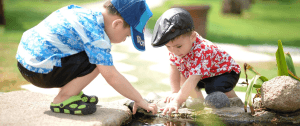Instilling a sense of responsibility in children through chores is more than just getting the dishes done or the room tidied. When approached thoughtfully, teaching kids to tackle tasks they’d rather avoid can foster creativity, critical thinking, and a positive mindset toward challenges—skills that will serve them well into adulthood. As a grandparent, I cherish Read More
Blog
Writing a Book with Your Child: A Creative Adventure
There’s something truly special about sitting down with your child to write a book together. It’s not just about putting words on a page—it’s about diving into their imagination, building memories, and creating something tangible that you both can cherish forever. Here’s why this experience is so rewarding and how you can make it happen. Read More
Navigating Tough Talks with Your Child
Difficult conversations with children are a crucial aspect of parenting. These discussions address important topics such as safety, health, emotions, and behavior. Engaging in challenging dialogues helps children develop essential life skills, including problem-solving, decision-making, and emotional regulation. These interactions also foster a strong, trusting relationship between parent and child, as the child learns to Read More
Encouraging Critical Thinking in Children: A Guide
Critical thinking is a vital skill for children to develop, enabling them to analyze, evaluate, and interpret information logically and thoughtfully. This ability encompasses independent thinking, reasoned judgment, and effective problem-solving. Children who possess strong critical thinking skills are better prepared to navigate the complexities of modern life and make informed decisions. Additionally, critical thinking Read More
The Importance of Humor in a Healthy Family Dynamic
Building strong bonds within a family is crucial for fostering a supportive and loving environment. When family members feel connected, they are more likely to communicate openly, trust each other, and provide emotional support during difficult times. One effective method for strengthening family bonds is by spending quality time together. This can involve participating in Read More
Identifying Toxic Family Dynamics: A Guide
Toxic family dynamics refer to unhealthy patterns of behavior and communication within a family unit. These dynamics often involve manipulation, control, emotional abuse, and poor boundaries. In toxic families, members may experience constant criticism, invalidation, or neglect, potentially leading to low self-esteem, anxiety, depression, and other mental health issues. These harmful patterns can be passed Read More
How to Identify Child Scapegoating
Child scapegoating is a form of emotional abuse where a child is unjustly blamed for family problems and dysfunction. This abuse can manifest as constant criticism, belittlement, or making the child feel responsible for family issues. The effects of scapegoating on a child’s emotional well-being can be severe, potentially leading to low self-esteem, anxiety, depression, Read More
Your Child’s Acting Out is a Form of Communication
Understanding children’s behavior is crucial for parents, teachers, and caregivers to provide appropriate support and guidance. Children’s behavior is influenced by various factors, including age, developmental stage, temperament, and environment. It is important to recognize that behavior serves as a form of communication, often reflecting children’s emotions, needs, and experiences. Cognitive and social development also Read More
Teaching Children Emotional Regulation and Coping with Overstimulation
Emotional regulation is a vital skill that children need to navigate the complexities of their feelings and reactions. It helps them manage their emotions in a healthy way, leading to better relationships, improved focus, and overall well-being. However, teaching children emotional regulation can be challenging, especially when they are faced with overstimulation. Here are some Read More
The Power of Recalling the Best Moments in Life
Every family experiences a mix of joy and challenges. While it’s natural to dwell on negative events or unfair circumstances, there is immense value in recalling the best moments and the lessons learned from them. As much as parents desire to protect their children from anything negative, it is a part of life that there Read More
How Family Vacations Can Build Confidence for Future Challenges
Vacation activities are bursting with experiential education. Through activities enjoyed by families on vacation, such as rope courses, climbing rock walls, and swimming, plays a significant role in shaping a child’s confidence and resilience. These experiences not only create lasting memories but also have a profound impact on the neurological development of children, setting a Read More
Utilizing Movies, Videos and Books to Understand Your Child Better
As parents, one of the key ways to connect with and understand your children is by paying attention to their preferences when it comes to shows and movies. By asking a simple question like, “What shows or movies make you laugh or think?”, you can gain valuable insights into your child’s sense of humor, thought Read More
Nurturing Safe Spaces: Understanding Children’s Comfort Zones
As parents, one of the most important aspects of caregiving is creating an environment where children feel comfortable and safe. Observing where and how your child seeks solace when feeling overwhelmed or unsafe can provide valuable insights into their emotional well-being. Here are some tips on how to recognize and support your child in finding Read More
Exploring the Influence of Music on Children’s Development
Music has a profound impact on individuals of all ages, but especially on children. Whether it’s dancing to a catchy tune or singing along to a favorite song, music plays a crucial role in a child’s development. parents, observing how your child responds to music can provide valuable insights into their preferences, personality, and cognitive Read More
Understanding Various Problem-Solving Approaches of Children Based on Personality Types
When it comes to problem-solving, children can have varying approaches based on their unique personality traits. As parents, gaining insights into how your child thinks and processes problem-solving can be invaluable in supporting their development. Let’s take a look at how different personality types may tackle problems or puzzles: Analytical Thinkers Analytical thinkers are logical Read More
The Importance of Stirring Creativity in Children
Unlock the potential of children by nurturing their creativity. Learn why stirring creativity in children is crucial for their development and future success. Encourage creativity in children to unlock their potential and foster problem-solving skills, self-expression, confidence, critical thinking, emotional development, innovation, and the joy of learning. Creativity is a vital skill that children should Read More
The Importance of Music and Dance for Children in Healthy Development
Music and dance play a vital role in the healthy development of children. From a young age, engaging in musical activities and dance can have a profound impact on a child’s cognitive, emotional, and social well-being. Cognitive Development Enhances Brain Function Studies have shown that music and dance stimulate multiple areas of the brain, Read More
Types of Books and Their Benefits in Children’s Learning Styles
Discover how picture books, storybooks, non-fiction books, poetry books, and interactive books can enhance children’s lives, and problem-solving abilities. Nurture a love for reading and support holistic development in children through diverse literary genres. When it comes to children’s learning styles, the types of books they read play a crucial role in shaping their development. Read More
Exploring Children’s Problem-Solving Approaches
Learn about trial and error, logical reasoning, creativity, collaboration, and more in this insightful blog post. Children are naturally curious beings, constantly seeking to understand the world around them through play, exploration, and problem-solving. When faced with a puzzle or a challenge, they employ various approaches to find a solution. Let’s delve into some of Read More



















